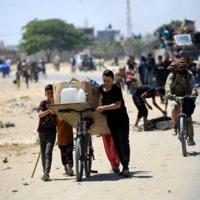Israeli forces carried out strikes in various parts of the Gaza Strip on Friday, with reports of air raids near the southern city of Rafah, marking continued hostilities in the nearly eight-month long conflict.
Despite international concerns about the safety of civilians in Rafah, Israel launched a military offensive in the city in early May. A recent strike that caused a fire at a displacement camp and resulted in numerous casualties led to further condemnation.
Witnesses reported Israeli strikes targeting Rafah and central Gaza’s Nuseirat on Friday, with intense bombardment in the northern areas as well. Medical sources reported a total of 11 casualties from strikes at two locations overnight.
The Israeli military stated that they are continuing operational activities in Rafah, where they found rocket launchers, weapons, and tunnel shafts. An air strike also targeted and eliminated a militant in the area.
In central Gaza, additional air strikes eliminated several terrorists who were operating near Israeli troops. Israel, in their efforts to destroy Hamas following an attack on southern Israel, had taken control of the Philadelphi corridor along the Gaza-Egypt border.
Egypt, a mediator in the conflict, has not officially responded to Israel’s takeover, which some officials believe could violate the countries’ peace deal. Hamas indicated that they would only agree to a comprehensive truce if Israel ceases its aggression.
Israel reported that approximately 300 Palestinian militants have been killed in Rafah since the start of the military operation. Many civilians have fled the city, adding to the humanitarian crisis in Gaza.
– Aid at sea –
Before the offensive in Rafah, the UN estimated that up to 1.4 million people were sheltering in the city. Since then, one million have evacuated, exacerbating the dire situation. The UN has warned of a looming famine in Gaza.
Israel’s control of the Rafah crossing has disrupted aid deliveries and effectively closed off the main exit point for Gaza. However, aid deliveries have increased through the Kerem Shalom crossing.
Cyprus announced that humanitarian aid bound for Gaza was being held at sea due to damage to a pier, preventing its delivery. Israeli Prime Minister Benjamin Netanyahu rejected accusations of deliberately targeting and starving Gaza civilians, calling them anti-Semitic slander. He stated that the ratio of militants to civilians killed in the offensive was low compared to urban conflicts.
Protests erupted outside a private broadcaster in Paris, with demonstrators voicing support for Gaza and criticizing the media coverage of the conflict.
– Car, house hit –
The Gaza war began after Hamas attacked southern Israel on October 7, resulting in numerous casualties and hostages. The retaliatory Israeli offensive has caused significant casualties in Gaza, with reports of strikes on residential areas.
An air strike on a house in Al-Bureij refugee camp and a strike on a car in Nuseirat resulted in multiple deaths. The situation remains tense, with ongoing discussions at the UN Security Council and calls for an immediate ceasefire.
Amidst the conflict, political tensions within Israel have also risen, with discussions of early elections and criticism of the government’s handling of the crisis.
bur-ami/dv





